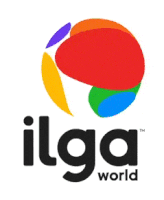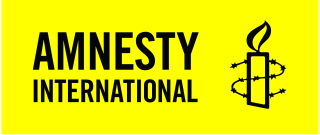
The International Lesbian, Gay, Bisexual, Trans and Intersex Association (ILGA) is an organization which is committed to advancing human rights to all people, disregarding gender identity, sex characteristics and expression. ILGA participates in a multitude of agendas within the United Nations, such as creating visibility for LGBTI issues by conducting advocacy and outreach at the Human Rights Council, working with members to help their government improve LGBTI rights, ensuring LGBTI members are not forgotten in international law, and advocating for LBTI women's issues at the Commission on the Status of Women.

The National Human Rights Commission of India is a statutory body constituted on 12 October 1993 under the Protection of Human Rights Ordinance of 28 September 1993. It was given a statutory basis by the Protection of Human Rights Act, 1993 (PHRA). The NHRC is responsible for the protection and promotion of human rights, defined by the act as "Rights Relating To Life, liberty, equality and dignity of the individual guaranteed by the constitution or embodied in the international covenants and enforceable by courts in India".
The human rights situation in Cambodia is facing growing criticisms both within the country and from an increasingly alarmed international community. After a series of flagrant violations against basic human rights a feeling of incertitude regarding the direction the country is emerging, sometimes comparing the situation to a newborn Burma.
Human rights in Finland are freedom of speech, religion, association, and assembly as upheld in law and in practice. Individuals are guaranteed basic rights under the constitution, by legislative acts, and in treaties relating to human rights ratified by the Finnish government. The constitution provides for an independent judiciary.
Contributing to the establishment of human rights system in Africa are the United Nations, international law and the African Union which have positively influenced the betterment the human rights situation in the continent. However, extensive human rights abuses still occur in many sections of the continent. Most of the violations can be attributed to political instability, racial discrimination, corruption, post-colonialism, economic scarcity, ignorance, illness, religious bigotry, debt and bad financial management, monopoly of power, lack/absence of judicial and press autonomy, and border conflicts. Many of the provisions contained in regional, national, continental, and global agreements remained unaccomplished.
A human rights defender or human rights activist is a person who, individually or with others, acts to promote or protect human rights. They can be journalists, environmentalists, whistleblowers, trade unionists, lawyers, teachers, housing campaigners, participants in direct action, or just individuals acting alone. They can defend rights as part of their jobs or in a voluntary capacity. As a result of their activities, human rights defenders (HRDs) are often subjected to reprisals including smears, surveillance, harassment, false charges, arbitrary detention, restrictions on the right to freedom of association, physical attack, and even murder. In 2020, at least 331 HRDs were murdered in 25 countries. The international community and some national governments have attempted to respond to this violence through various protections, but violence against HRDs continues to rise. Women human rights defenders and environmental human rights defenders face greater repression and risks than human rights defenders working on other issues.

In law, sex characteristic refers to an attribute defined for the purposes of protecting individuals from discrimination due to their sexual features. The attribute of sex characteristics was first defined in national law in Malta in 2015. The legal term has since been adopted by United Nations, European, and Asia-Pacific institutions, and in a 2017 update to the Yogyakarta Principles on the application of international human rights law in relation to sexual orientation, gender identity, gender expression and sex characteristics.
Human rights in Poland are enumerated in the second chapter of its Constitution, ratified in 1997. Poland is a party to several international agreements relevant to human rights, including the European Convention on Human Rights, the Universal Declaration of Human Rights, the Helsinki Accords, the International Covenant on Civil and Political Rights, the International Covenant on Economic, Social and Cultural Rights and the Convention on the Rights of the Child.

Amnesty International is an international non-governmental organisation focused on human rights, with its headquarters in the United Kingdom. The organization says it has more than ten million members and supporters around the world. The stated mission of the organization is to campaign for "a world in which every person enjoys all of the human rights enshrined in the Universal Declaration of Human Rights and other international human rights instruments." The organization has played a notable role on human rights issues due to its frequent citation in media and by world leaders.

Discussions of LGBT rights at the United Nations have included resolutions and joint statements in the United Nations General Assembly and the United Nations Human Rights Council (UNHRC), attention to the expert-led human rights mechanisms, as well as by the UN Agencies.
Lubna Ahmed al-Hussein is a Sudanese Muslim, media worker and activist who came to international attention in July 2009, when she was prosecuted for wearing trousers. Her case became a cause célèbre, with organisations such as the Arabic Network for Human Rights Information and Amnesty International issuing statements in support.

Assistance Association of Political Prisoners (Burma) is an independent non-profit organisation founded by Burmese former political prisoners living in exile. Mainly staffed by ex-political prisoners, its main aims are to provide assistance for other Burmese political prisoners, and to document news related to them.

Intersex Human Rights Australia (IHRA) is a voluntary organisation for intersex people that promotes the human rights and bodily autonomy of intersex people in Australia, and provides education and information services. Established in 2009 and incorporated as a charitable company in 2010, it was formerly known as Organisation Intersex International Australia, or OII Australia. It is recognised as a Public Benevolent Institution.
Criticism of Amnesty International includes claims of selection bias, as well as ideology and foreign policy bias against either non-Western countries or Western-supported countries. Various governments criticized by have Amnesty International have in turn criticized the organization, complaining about what they assert constituted one-sided reporting.

David Kaye was the United Nations special rapporteur on the Promotion and Protection of the Right to Freedom of Opinion and Expression between August 2014 and July 2020. He was succeeded by Irene Khan. Kaye is clinical professor of law at the University of California, Irvine on public international law, international humanitarian law human rights and international criminal justice. He is co-director of the UCI Fair Elections and Free Speech Center working at the intersection of technology, freedom of speech and democratic deliberation. He is also the independent board chair of the Global Network Initiative.
Amnesty International Thailand (AITH), also known as Amnesty Thailand or AI Thailand, is a non-governmental organisation (NGO) focused on the protection of human rights in Thailand and worldwide with more than 1,000 members across Thailand. Amnesty Thailand is one of more than 70 "sections" that make up Amnesty International worldwide.

Basic human rights in Italy includes freedom of belief and faith, the right of asylum from undemocratic countries, the right to work, and the right of dignity and equality before the law. Human rights are the basic rights of every citizen in every country. In Italy, human rights have developed over many years and Italy has education on human rights. In addition, Italy has specific human rights for women, children and LGBT people. There are some organizations that support human rights in Italy.

Human rights in Lithuania have been the subject of much coverage. Lithuania scores 91 out of 100 in 2019 report by Freedom House, which classifies the country as "free", with high rankings in civil liberties and political rights. In particular, Lithuania ranks 30th among 180 countries, well above the world's average level in press freedom, and achieves a full score in freedom of assembly and nongovernmental organisations. However, there are concerns regarding children's welfare, domestic violence, discrimination against minorities including the Roma, Jews and LGBTI people, as well as inhumane treatments of prisoners. The Constitution of Lithuania guarantees the protection of human rights.
Vitalina Koval is an Ukrainian human rights activist. She campaigns for women rights and LGBTI rights. She is from Uzhhorod.

Human rights in Nicaragua refer to personable, political and social rights granted to every human in Nicaragua. Nicaragua derives its understanding of human rights from the Constitution of Nicaragua and international law. Nicaragua is a member state of the United Nations which states that fundamental human rights, such as freedom from slavery and freedom of expression, are enabled for all human beings without discrimination.











